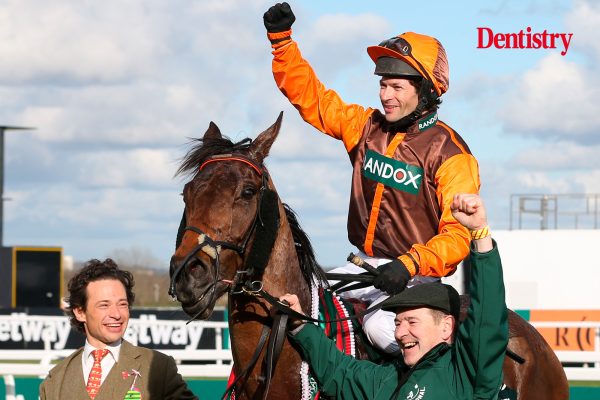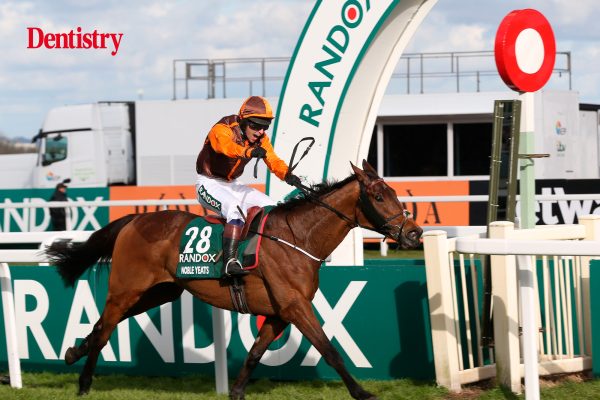
A few weeks following Sam Waley-Cohen becoming the Grand National winner, we spoke to the Portman Dental Care CEO to find out more about his victory.
Sam, congratulations on becoming the Grand National winner! How does it feel?
It’s been amazing.
It’s been a wild couple of weeks, just so much goodwill, so much happiness.
But amazing, a real bubble.
You won the Grand National and then announced your retirement. Going in, did you know that would be your last race?
I decided a few weeks before that was going to be my last race.
I made an announcement on Thursday in the amateur version of the Grand National, which is called the Foxhunters – that’s once around the track.
After that I was going to retire on Saturday in the National. So I was already committed that was going to be the last time racing in public.
Most of us will never experience what it’s like to race in the Grand National. Talk us through the buildup, what it’s like and what’s going through your mind.
The really big races like the Grand National have a huge amount of buildup. It’s the people’s race, everyone’s excited.
Everybody that you know or have ever met or have a connection to spots you and asks how you’re going to get on and all that sort of thing.
There’s huge excitement and the Nationals are late, it’s about 5:15 in the day.
You have all day wandering around, you walk the course. You try to keep yourself calm and there’s always quite a bit of media to do before the race.
Then a couple of hours before, you go and really try to get in the zone and get focused ready for the race.
Taking it further back, how do you prepare for the day?
There’s nothing very specific. You need a partnership with the horse. If it’s the first time that you were riding the course on the day then you’d have wanted to practise in your mind at least what it means to ride that course.
It’s about going through the tactics, visualising what you want to do. Actually for me, I’ve ridden the course quite a few times. I’ve ridden in 10 Grand Nationals, so in a way it was quite relaxed on the day.
I sort of knew what to expect and knew what had gone right on other days and what hadn’t gone right. So it was really about trying to get all the bits to stick together.
Ok, can you talk us through the race. What’s going through your mind.
When you’re lining up, the first thing is that your first job is done, which is to get on the horse and keep the horse calm at the start.
There’s 70,000 people there when you parade in front of the crowd. I remember going down to the start, counting down to the race start.
They’re playing the national anthem with a band blaring it out. So there’s a lot of atmosphere, there’s a lot of rev.
Your first job is to get to the start without any mishaps, because that’s an unusual environment for any horse. And then at the start, it’s trying to get a good position, so trying to understand which horses you’re a bit worried about how they’re going to jump or they’re going to cause problems which you think are well fancied.
You might want to cover them off. Then it’s a bit of a cavalry charge down to the first jump. It’s all steam ahead, and you are literally flat to the board. There’s no real place for hiding. You’ve got to go for it and take your chances.
You almost commit and hope the horses in front of you jump and don’t cause you any trouble and you land over the first one.
Take a bit of a deep breath and think: ‘Ah ok, not a disaster at the first, now we’ll try and settle in and ride the race’.

Were you put off by any of the horses around you?
You’re not really put off.
At the National particularly, you’re always trying to ride the other horses around you because something even 15-20 metres in front of you can cause problems to the horses between you and it.
That’s often where the problems happen, so you’re really trying to be super aware of everything around you.
Half the job is to concentrate on your horse, the fences and anticipate the problems in front of you before they happen.
Keep trying to find little spaces where you’ve got more chance.
As you come round the bend, everybody is screaming and shouting. We can hear that on TV, do you feel the atmosphere yourself?
I don’t actually have any recollection of the crowd at all to be honest.
You go round the course twice, so you come past the crowd once before you finish.
The first-time round there was a big cheer and I did hear that, but the second time I guess the cheering is at its loudest, you’re just so focused on the race itself and doing what you need to do that I just don’t remember it at all.
It’s a really weird memory blank.
You jump the final hurdle and you’re neck and neck with another rider. What’s going through your head, why do you win over the other horse?
The last fence is the classic last obstacle. Many have slipped at the last. Landing on that, you just want to get the horse balanced first.
After that it’s all about letting the horse ride itself.
The horse has to ride itself to levels it’s never found before, it’s got to fight. You’re in a real boxing match with the other horse all the way to the line and it’s the one that wants it the most who wins.
It is really knuckle down and push hard all the way to the finish line.

How does it feel once you cross the finish line?
Wild. So much emotion, then you hear the crowd. There’s a lot of emotion, it’s a dream. As a schoolboy, I’d literally dreamt about it.
To be there to do it, you just feel incredible. Thanks one to the horse, but also everyone that’s helped you, not just on that day but throughout your career.
But actually as a jockey your job isn’t done. You still have a lot of responsibility for the welfare of the horse – is the horse okay?
While everybody is celebrating and you are in your heart, in your mind you’re thinking look after the horse, make sure he’s ok to get in and weighed.
If he doesn’t weigh right you lose the race. Your job isn’t done at that point, so you’re balancing those two emotions.


